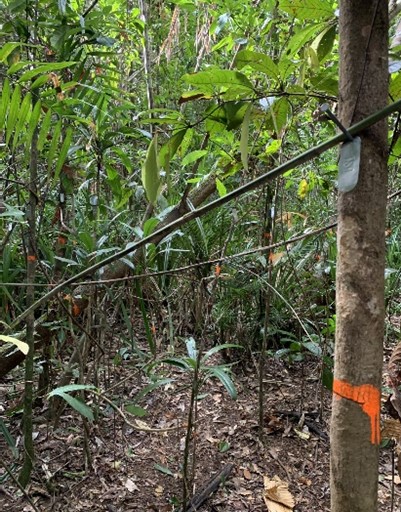This month, The Applied Ecologist is amplifying the voice of early career ecologists from around the world working in the field of applied ecology to help inspire the next generation. In this post, Charlotte Raven, a second-year PhD student at the University of the Sunshine Coast, Australia, shares her story.
My background
I have had a passion for insects my entire life; I think it started when I realised I wasn’t afraid of spiders.
I grew up in Essex, England, so spiders were the most interesting thing I would find around the house (unlike Australia, where I live now, where my neglected spare-room is home to more biodiversity than a rainforest). I remember that I used to give the house spiders to my friends to hold at the age of 6.
One day my friend flung the spider away in fright, but it had attached silk to her so just climbed right back up on her poor unsuspecting hand. While this must have been quite traumatic for her, I think this is what opened my mind to a passion for science. At some point after this, my parents brought me a book called “The Big Book of Knowledge” by John Farndon – I read all about spiders, how they produce silk, and how big they can get (outside of Essex)!
To date, I have been lucky enough to complete various fieldwork adventures for my undergraduate degree and independent research around the globe including Borneo, Brunei, and within Australia. I was also lucky enough to have a job managing the production of an invertebrate biological control agent used by many agricultural practices. Nevertheless, through my numerous experiences I found myself drawn to tropical rainforests more than other biome.
Where I am now
I am now lucky enough to be completing my PhD in tropical rainforest entomology at the Forest Research Institute at the University of the Sunshine Coast, Australia, with a focus on conserving both rainforests and the insects within them. More specifically, I am working on a project to examine the influence of disturbance and liana (woody vine) proliferation on invertebrate indicators of rainforest function in Far North Queensland, Australia.
While the negative impacts of human disturbance and natural events such as cyclones on tropical rainforests are well documented, less is known about the effects of lianas on invertebrates and ecosystem functioning.
To date, it is not currently known: a) how invertebrate functional diversity and community composition vary with liana proliferation following heavy disturbance; b) whether liana proliferation influences the functional role of invertebrates (i.e. predation and decomposition); and c) what the climate (elevational) influence on invertebrate responses to liana proliferation is. Understanding the complex interactions between lianas, trees, and invertebrates in these tropical ecosystems will provide new knowledge about rainforest dynamics and resilience in the face of increasing disturbance.
Importantly, my work will help make significant contributions to both basic scientific understanding and practical applications in environmental management and policy.
My next research phase involves gathering additional samples of invertebrates and analysing the data to examine potential practical implications for managing tropical rainforests. I will explore methods of controlling liana proliferation to aid in ecosystem restoration and investigate whether specific groups or species of invertebrates can serve as reliable indicators of tropical rainforest resilience or recovery.
I am really excited to take these next steps and then to present my work at conferences to communicate it to other researchers and practitioners.
What motivates me?
I am very motivated by my passion for insects and entomology in general – there is an endless list of unanswered questions about “The little things that run the world”. There are 2.5 million ants for every human alive today and we still don’t fully know the precise mechanisms by which ants navigate and calculate distances and directions! The opportunity to immerse myself in tropical rainforests and witness the incredible wildlife they hold serves as a tremendous source of inspiration, compelling me to keep going.
My family has also been a huge source of motivation for me, and if my parents never gave me my big book of knowledge, I might not be where I am today.
My role model
I wouldn’t say I have just one role model. I am constantly being inspired by the people around me – colleagues, supervisors, academics, family, friends and of course, Sir David Attenborough. Combining the wisdom and inspiration I’ve drawn from these diverse role models; I have learned valuable lessons that shaped both my character and perspectives. The value of perseverance has become ingrained in me, understanding that challenges are steppingstones, not barriers. Ultimately, having multiple role models has provided me with a richer outlook on the world, giving me passion and perseverance.
One piece of advice
Remember the purpose behind starting your research, be it a childhood passion, inspiration, or love for your field (such as entomology). Despite life’s challenges, stay motivated, remain consistent and keep moving forward!
Discover more posts from our ECR Journeys blog series here.











Thank you for sharing your story, Charllote. It’s wonderful to hear about your life journey and how your research has been motivated by such inspiring experiences.
LikeLike